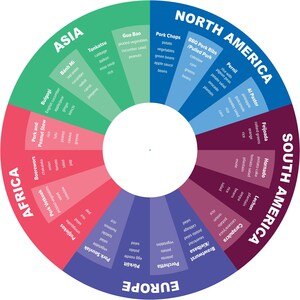National Pork Board research shows pork, particularly ribs and chops, is the meat of choice for Hispanics and African Americans during grilling season
DES MOINES, Iowa, May 31, 2018 /PRNewswire/ -- With Summer just around the corner, consumers have plenty of grilling opportunities to be outdoors this summer. To help all cooks – from beginners to experts – The National Pork Board announces a new grilling campaign to engage and inform multicultural consumers about the key health and flavor benefits of pork.
A new research study conducted by the National Pork Board shows that Latinos and African Americans enjoy eating ribs and pork chops during grilling season. The study shows Hispanics and African Americans are more likely to consume pork chops and ribs during grilling season than any other demographic.
With the insight that Hispanics and African Americans prefer grilling pork over other proteins, The National Pork Board will reach this growing demographic via influencer partnerships who will create original, flavorful and relevant pork recipes for consumers to enjoy at home.
"Hispanics and African Americans love pork and the research we conducted validates that," said Jose de Jesus, director of multicultural marketing at The National Pork Board. "We also learned that in general shoppers statistically spend more in-store when ribs and pork chops are in their baskets."
According to Nielsen, which conducted the study for the National Pork Board, the shopping cart is worth $121.47 when pork chops and ribs are in the basket vs $32.54 when they are not. "When retailers feature pork chops and ribs during grilling season consumers spend more money at their stores," de Jesus said. "For retailers across the nation, this is incredibly valuable information."
This grilling season, The National Pork Board will be focusing on two important benefits of pork -- flavor and health. Pork is a protein that cooks quickly, does not require much seasoning to make it delicious, and pairs well with your favorite side dishes. Studies show pork is low on calories and high in nutrients, making it the ideal and smart choice when choosing a protein for grilling. Roasting pork or grilling is a healthier alternative that does not add fat to the protein.
In addition to delicious flavor, pork also holds numerous health benefits. Eight cuts of pork -- from tenderloin and sirloin pork chop to ribeye pork chop – meet the United States Department of Agriculture guidelines for lean. The pork industry has made positive adjustments in feeding and management practices to make pork leaner. Seven of the most common cuts of pork have, on average, 16% less fat and 27% less saturated fat than 20 years ago. Pork also has numerous nutrients that can improve overall health by adding a 3-ounce serving of roasted, trimmed pork tenderloin to your diet, which is an excellent source of B-vitamins and selenium.[1]
In addition to delicious flavor, pork is a lean, naturally nutrient-rich source of protein that is familiar and accessible to many consumers. Fresh pork is more than just a good source of protein; it also provides several vitamins and minerals including thiamin, phosphorus, zinc, selenium, niacin, vitamin B6, and vitamin B12. Today's most popular cuts have 16 percent less total fat and 27 percent less saturated fat than they did 26 years ago. Cuts of pork that come from the loin – including chops, roasts and 96 percent lean ground pork – are the leanest cuts of pork available.
"Consumers can enjoy eight cuts of pork that have less fat than a skinless chicken thigh. The popular pork tenderloin has the same amount of fat as a skinless chicken breast," de Jesus said.
For more information about the campaign and to find expert tips, and new healthy and flavorful recipes, please visit PorkEsSabor.com and follow along on social media at @PorkEsSabor on Facebook, Twitter, and Instagram. Join the conversation using #PorkEsSabor.
About National Pork Board
The National Pork Board has responsibility for Checkoff-funded research, promotion and consumer information projects and for communicating with pork producers and the public. Through a legislative national Pork Checkoff, pork producers invest $0.40 for each $100 value of hogs sold. Importers of pork products contribute a like amount, based on a formula. The Pork Checkoff funds national and state programs in advertising, consumer information, retail and foodservice marketing, export market promotion, production improvement, technology, swine health, pork safety and environmental management. For more information, visit Pork.org.
PorkEsSabor.com is a Spanish resource of pork information and inspiration, including easy-to-make and delicious recipes, nutritional content of pork, choice cuts, health and safety information and cooking tips.
[1] U.S. Department of Agriculture, Agricultural Research Service (2010). USDA National Nutrient Database for Standard Reference, Release 23. Accessed July 5, 2012 from http://www.ars.usda.gov/ba/bhnrc/ndl
SOURCE National Pork Board
Related Links
WANT YOUR COMPANY'S NEWS FEATURED ON PRNEWSWIRE.COM?
Newsrooms &
Influencers
Digital Media
Outlets
Journalists
Opted In




Share this article